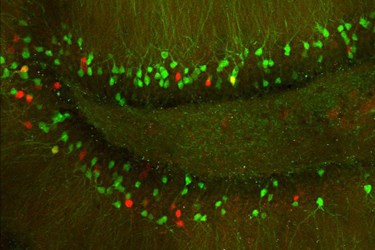Glowing Memories: Decoding Alzheimer's With Neuron Tagging And Optogenetics
By Sara Jerome,
@sarmje

One front in the fight against Alzheimer's disease is getting very specific about where memories live in the body.
Researcher Christine Ann Denny has "developed a technique to label the cells that encode individual memories in the brains of mice," according to a blog from National Institutes of Health (NIH) Director Francis Collins.
Denny tags neurons, the nerve cells that build memories, using "a fluorescent molecule that glows," the blog said.
Denny is studying how memory patterns change as the mice age and experience new circumstances. "To date, she has created and labeled a specific memory in mice and then evaluated how the neural representation of the memory changes as the animals grow older or encounter stress," the blog said.
The next step? To "investigate what happens to memory-bearing neurons over the course of a lifetime, in normal and aged mice, and in a mouse model of Alzheimer’s disease," by combining Denny’s labelling technology with optogenetics, using light to cause neurons to fire or stop firing. (For the uninitiated, MIT News recently posted a nice video overview of optogenetics on YouTube.)
The upshot is that this research could help identify new treatments for halting and reversing memory loss related to Alzheimer's disease.
An effective solution for Alzheimer's disease has eluded the medical community for decades. "Alzheimer's scientists are starting to believe that a main reason they haven't yet found a treatment — not a single drug that will significantly slow down or stop the disease — is because they've been focusing on just one hole in the roof," the San Francisco Chronicle reported last week.
"In Alzheimer's we're really pretty far behind the curve. This is an impending public health crisis, and it would be very rational for us to invest in a lot of different ideas about how to treat the disease," Dr. Gil Rabinovici, a neurologist in the Memory and Aging Center at the University of California, San Francisco (UCSF), said in the San Francisco Chronicle.
The problem of Alzheimer's disease is becoming more pressing as the baby-boomers age. Maine Sen. Susan Collins and Ronald Petersen, director of the Mayo Clinic Alzheimer's Disease Research Center, call it "the defining disease of this generation."
"With baby boomers turning 65 at a rate of 10,000 persons per day, it is estimated that nearly one in two of the baby boomers reaching 85 will develop Alzheimer’s," they wrote in a Lewiston Sun Journal editorial this week. "As a consequence, chances are that members of the baby boom generation will either be spending their golden years with Alzheimer’s or caring for someone who has it."
Image credit: Christine Denny, Columbia University
